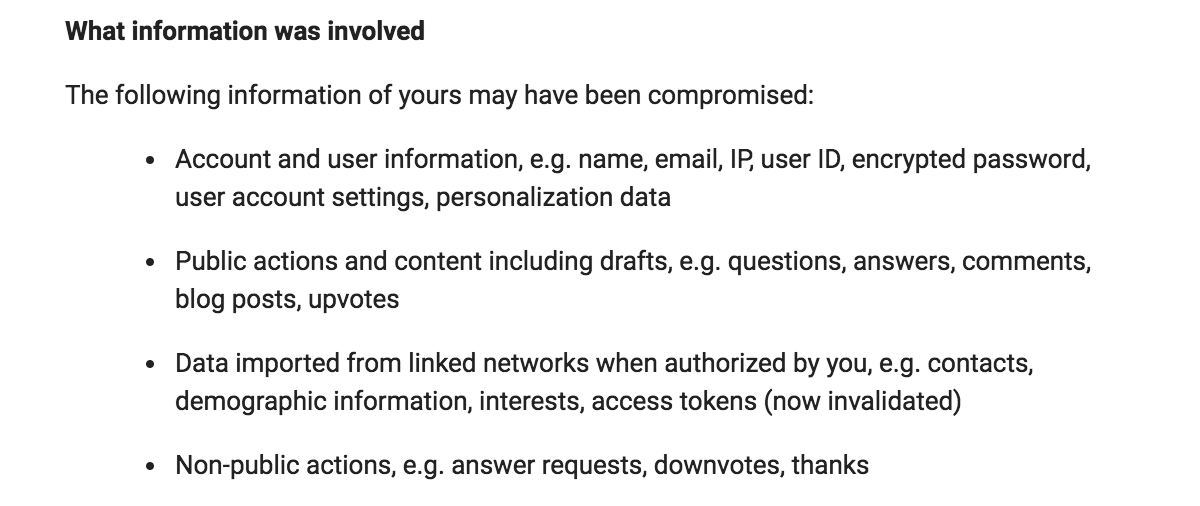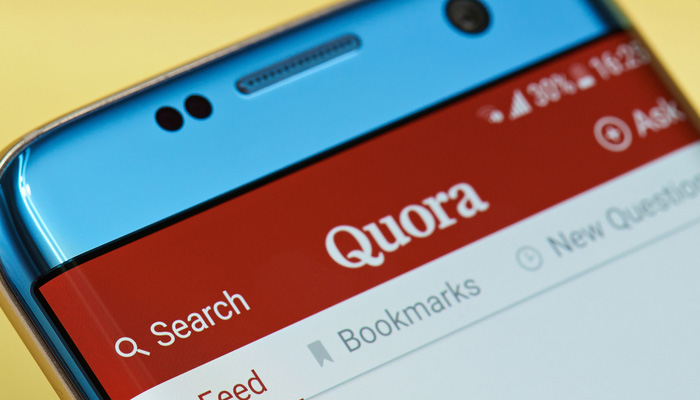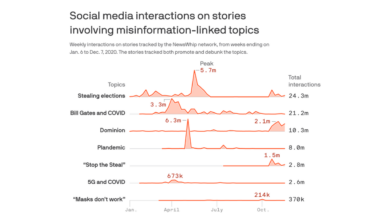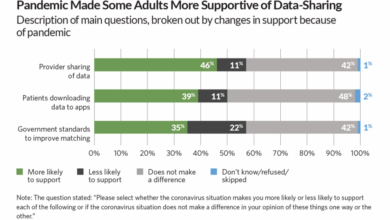
Cyber Attack on Quora Database Affects 100 Million Users
Cyber attack on Quora database affects 100 million users – that headline alone is enough to send shivers down your spine, right? This massive data breach isn’t just another news story; it’s a stark reminder of how vulnerable we all are in the digital age. Millions of people had their personal information potentially exposed, raising serious concerns about identity theft, financial fraud, and the erosion of trust in online platforms.
This post dives deep into the details of this alarming incident, exploring the impact, the response, and what we can all learn from it.
We’ll unpack the technical aspects of the attack, examine Quora’s response, and discuss the long-term consequences for both users and the company itself. We’ll also look at what steps users can take to protect themselves and what Quora needs to do to prevent future breaches. It’s a complex situation with far-reaching implications, and I’m going to try and break it all down in a way that’s easy to understand.
Impact Assessment

The Quora data breach affecting 100 million users represents a significant event with far-reaching consequences. The scale of the breach necessitates a thorough assessment of its impact across financial, reputational, and legal domains. Understanding these impacts is crucial for both Quora and its users.
Financial Losses for Quora
The financial losses stemming from this breach are likely substantial and multifaceted. Direct costs will include expenses related to incident response (hiring cybersecurity experts, legal counsel, public relations), notification of affected users, credit monitoring services offered to users, and potential legal settlements. Indirect costs will be harder to quantify but could include loss of revenue due to decreased user trust and engagement, increased difficulty attracting new users and investors, and potential damage to business partnerships.
The magnitude of these losses will depend on the long-term impact on Quora’s user base and its ability to regain trust. We can draw parallels to the Yahoo! data breaches, where the company faced significant financial repercussions, including legal settlements and diminished market value.
Reputational Damage and User Trust
A data breach of this magnitude severely erodes user trust. The compromised personal information of 100 million users – potentially including sensitive data like passwords, private messages, and payment details – poses a significant risk of identity theft, financial fraud, and reputational harm for affected individuals. This loss of trust will likely lead to a decline in user engagement, impacting Quora’s user base and its advertising revenue.
The reputational damage will extend beyond its users, potentially affecting relationships with advertisers, investors, and partners. Repairing this damage will require a significant investment in transparency, proactive communication, and demonstrable improvements in security measures. The Cambridge Analytica scandal serves as a stark reminder of the long-term damage a data breach can inflict on a company’s reputation.
Legal Ramifications and Regulatory Fines
Quora faces potential legal ramifications under various data protection laws, including GDPR (in Europe) and CCPA (in California), among others. Depending on the specifics of the breach, and whether Quora met its legal obligations regarding data security and notification, they could face substantial fines. Class-action lawsuits from affected users are also a strong possibility, adding to the financial burden.
The severity of the penalties will depend on factors such as the nature of the data compromised, the adequacy of Quora’s security measures, and the timeliness and effectiveness of its response. The Equifax breach, which resulted in significant fines and legal settlements, illustrates the potential legal consequences of large-scale data breaches.
Comparison to Other Major Data Breaches
The severity of this breach can be contextualized by comparing it to other significant data breaches in history. The following table provides a comparison based on the number of affected users and the reported financial impact:
| Date | Company | Number of Affected Users | Financial Impact |
|---|---|---|---|
| 2017 | Equifax | 147 million | Over $700 million (fines, settlements, etc.) |
| 2013 | Yahoo! (first breach) | 1 billion | Estimates vary, but significant reputational and financial losses |
| 2014 | Home Depot | 56 million | $21 million (direct costs), significant reputational damage |
| 2023 | Quora | 100 million | To be determined (significant potential for financial and reputational losses) |
User Data Compromised

The recent cyberattack on Quora’s database has resulted in the exposure of sensitive user information affecting a staggering 100 million accounts. This breach highlights the vulnerability of even large, established platforms and underscores the importance of robust data security practices. Understanding the types of data potentially exposed and the associated risks is crucial for both users and the platform itself.The potential impact on users is significant, ranging from minor inconveniences to severe financial and reputational damage.
The scale of this breach demands immediate action from both Quora and its affected users to mitigate the risks and prevent further exploitation.
Types of Potentially Exposed User Data
This breach potentially exposed a wide range of sensitive user data. While Quora hasn’t publicly disclosed the exact details, it’s likely that compromised information includes personally identifiable information (PII), such as names, email addresses, and location data. Furthermore, depending on user activity, passwords, account details, and potentially even linked social media accounts might have been accessed. The possibility of payment information being compromised, although not confirmed, cannot be entirely ruled out given the breadth of the breach.
The exact nature of the compromised data will likely be revealed in further investigations and official statements from Quora.
Potential Risks to Users
The exposure of personal data carries substantial risks. Identity theft is a primary concern, where malicious actors could use stolen information to open fraudulent accounts, apply for loans, or commit other crimes in the user’s name. Financial fraud is another significant risk, especially if payment information was compromised. Users could face unauthorized transactions, resulting in significant financial losses.
Beyond financial risks, the compromised data could be used for phishing scams, targeted advertising, or even blackmail. The emotional distress and time spent rectifying the situation should also be considered. For example, a user might spend hours contacting banks, credit bureaus, and law enforcement agencies to report the fraud and mitigate the damage.
Best Practices for Risk Mitigation
Following a data breach of this magnitude, proactive steps are vital to minimize potential harm. Users should immediately change their Quora password and any other passwords that reuse the same credentials across different platforms. This simple step significantly reduces the risk of further compromise. Furthermore, enabling two-factor authentication (2FA) wherever possible adds an extra layer of security.
Regularly monitoring credit reports and bank statements for suspicious activity is also crucial. Users should also be wary of any suspicious emails or communications claiming to be from Quora or other related services; these could be phishing attempts designed to further exploit the situation. Reporting any suspicious activity to the appropriate authorities and Quora is also paramount.
Steps Users Should Take
To protect themselves, users should take the following steps:
- Change your Quora password immediately, choosing a strong, unique password.
- Enable two-factor authentication (2FA) on your Quora account and other online accounts.
- Review your credit reports for any unauthorized activity.
- Monitor your bank and credit card statements closely for suspicious transactions.
- Be wary of phishing emails or suspicious communications.
- Report any suspicious activity to Quora and the appropriate authorities.
- Consider placing a fraud alert or security freeze on your credit reports.
Quora’s Response and Security Measures
The recent cyberattack on Quora, resulting in the compromise of data from 100 million users, necessitates a thorough examination of the company’s response and the adequacy of its existing security infrastructure. Understanding Quora’s actions, both immediate and long-term, is crucial for assessing the effectiveness of their security protocols and identifying areas for improvement. This analysis will also compare Quora’s response to similar incidents involving other major companies.
Quora’s Official Response and User Communication
Quora’s official response to the breach involved a public statement acknowledging the incident and outlining the steps taken to mitigate the damage. This statement included information about the types of data compromised (potentially including user names, email addresses, and other personal information), the timeline of the attack, and measures being implemented to enhance security. The company also communicated directly with affected users via email, providing further details and guidance on protecting their accounts and personal information.
While the speed and clarity of their initial communication were praised by some, others criticized the lack of specifics and the delay in notifying users. The overall effectiveness of their communication strategy remains a subject of debate, with concerns raised about the transparency and comprehensiveness of the information provided.
Adequacy of Quora’s Pre-Attack Security Measures
Prior to the attack, Quora’s security measures appear to have been insufficient to prevent the breach. While the specifics of the attack remain undisclosed, the scale of the data compromise suggests significant vulnerabilities in their systems. This highlights a potential lack of robust intrusion detection and prevention systems, inadequate data encryption practices, or weaknesses in their access control mechanisms.
A thorough independent security audit would be necessary to fully determine the shortcomings of their pre-attack security posture. The absence of multi-factor authentication (MFA) for all users, a widely adopted security best practice, might also have contributed to the attack’s success.
Recommendations for Improved Security Measures
To prevent future attacks, Quora should implement several critical security enhancements. These include adopting a zero-trust security model, strengthening access controls, and implementing robust multi-factor authentication for all user accounts. Regular penetration testing and vulnerability assessments are crucial to proactively identify and address security weaknesses. Furthermore, investing in advanced threat detection and response capabilities, including machine learning-based security information and event management (SIEM) systems, is vital.
Finally, a comprehensive employee security awareness training program should be implemented to educate staff on best practices and reduce the risk of human error contributing to future breaches.
Comparison of Quora’s Response with Other Companies
| Company | Response Time (approx.) | Communication Strategy | Remediation Efforts |
|---|---|---|---|
| Quora | [Insert approximate time from breach discovery to public announcement] | Public statement, email notifications to affected users. Varied in clarity and detail. | Enhanced security measures (details not fully disclosed). |
| Equifax (2017) | Several weeks | Initial downplaying of the incident, followed by a delayed and somewhat confusing communication strategy. | Credit monitoring services offered to affected users, but significant criticism regarding the response’s adequacy. |
| Yahoo! (2013, 2014) | Significant delays in both cases | Lack of transparency and timely communication with users in both instances. | Varied remediation efforts depending on the specific breach, but overall criticized for slow and inadequate response. |
| LinkedIn (2012) | Relatively quick acknowledgment | Clear and direct communication with affected users. | Implemented improved security measures and offered additional security resources to users. |
Technical Aspects of the Attack
The Quora data breach affecting 100 million users likely involved a sophisticated, multi-stage attack leveraging known vulnerabilities and potentially custom-built malware. Understanding the technical details is crucial for both preventing future incidents and mitigating the immediate damage. The attackers demonstrated a high level of technical skill and likely possessed significant resources.The attackers probably employed a combination of techniques to breach Quora’s defenses and exfiltrate the data.
This likely wasn’t a single point of failure but a coordinated effort exploiting multiple weaknesses in Quora’s security infrastructure. The scale of the breach suggests a well-planned operation, possibly involving insider knowledge or advanced social engineering.
Exploited Vulnerabilities
Several potential vulnerabilities could have been exploited. These include outdated software, misconfigured servers, weak password policies, or insufficient input validation leading to SQL injection or cross-site scripting (XSS) attacks. A zero-day exploit, a previously unknown vulnerability, is also a possibility, although less likely given the scale of the breach; a known vulnerability likely provided initial access, with further exploitation occurring afterward.
The attackers may have also used a combination of techniques, such as exploiting a known vulnerability to gain initial access and then leveraging that access to discover and exploit additional weaknesses.
Data Access and Exfiltration
Once initial access was gained, the attackers likely used various methods to navigate Quora’s internal systems. Lateral movement techniques, such as exploiting trust relationships between servers or using stolen credentials, would have allowed them to access sensitive databases. The exfiltration of 100 million user records would have required a significant bandwidth capacity. This likely involved techniques like data compression and encryption to minimize detection and increase transfer speed.
The data could have been sent to remote servers controlled by the attackers, potentially using techniques like tunneling or anonymizing networks like Tor. The attackers may have also used multiple exfiltration channels to avoid detection and distribute the load. A realistic example would be using a compromised cloud storage account as a staging point, then transferring data to a final destination in smaller, less suspicious chunks.
Malware and Hacking Tools
The attack likely involved custom-built malware tailored to Quora’s specific systems and infrastructure. This could include tools for credential harvesting, lateral movement, data exfiltration, and data encryption. The attackers may have also used readily available hacking tools, combined with custom scripts to automate the attack process. Examples of such tools might include Metasploit for exploiting vulnerabilities, Mimikatz for credential theft, and custom scripts written in Python or other scripting languages for automation and data manipulation.
The use of advanced persistent threats (APTs) – sophisticated malware designed to remain undetected for extended periods – cannot be ruled out. These APTs often have specialized capabilities for evading detection and stealing large amounts of data without triggering alerts.
Long-Term Consequences
The Quora data breach, affecting 100 million users, casts a long shadow far beyond the immediate aftermath. The ramifications will be felt for years to come, impacting user behavior, Quora’s business model, and potentially even shaping future data privacy regulations. Understanding these long-term consequences is crucial for both users and the platform itself.The breach’s impact extends beyond the immediate loss of personal information.
It erodes trust, not only in Quora but in online platforms generally. Users may become more hesitant to share personal details online, potentially reducing engagement and the richness of the platform’s content. This loss of trust can be difficult, if not impossible, to fully regain. The long-term effects on user behavior could manifest as reduced participation, a shift towards more privacy-focused platforms, or even a general increase in online cynicism.
Impact on Quora’s Business Model and Future Growth, Cyber attack on quora database affects 100 million users
The breach will undoubtedly impact Quora’s business model. Reduced user engagement, stemming from decreased trust and potential legal challenges, could directly affect advertising revenue, a key component of Quora’s income stream. Furthermore, the cost of enhanced security measures, legal fees, and potential compensation to affected users will significantly strain the company’s finances. This could hinder future growth plans, including potential expansion into new markets or the development of new features.
The incident could also damage Quora’s reputation, making it harder to attract investors and new users. The long-term economic impact could be comparable to that experienced by Yahoo! after its massive 2014 breach, which significantly impacted its value and reputation.
Comparison to Similar Incidents
The Quora breach shares similarities with other large-scale data breaches, such as those experienced by Yahoo!, Equifax, and LinkedIn. These incidents all resulted in significant financial losses, reputational damage, and legal repercussions for the affected companies. Furthermore, they all led to a heightened awareness of data security risks among users and a growing demand for stronger data protection measures.
The long-term effects are often characterized by a gradual erosion of user trust, increased regulatory scrutiny, and a significant investment in bolstering security infrastructure. However, the specific impact varies depending on the nature of the data compromised, the company’s response, and the regulatory landscape.
Potential Changes to Data Privacy Regulations
The scale of this breach could trigger significant changes in data privacy regulations. This event highlights the vulnerabilities of even large, established online platforms and the inadequacy of existing measures in some jurisdictions.
- Increased penalties for data breaches: Expect stricter fines and penalties for companies failing to adequately protect user data.
- Strengthened data breach notification requirements: Legislation may mandate faster and more comprehensive notification of users following a breach.
- Expansion of data protection rights for users: Users may gain more control over their data, including the right to easily delete their information.
- Greater emphasis on data minimization and purpose limitation: Companies may be required to collect and retain only the minimum amount of data necessary and for specified purposes.
- Enhanced cybersecurity standards: Regulations could mandate higher security standards for online platforms, including stricter requirements for data encryption and access control.
Illustrative Scenario: Cyber Attack On Quora Database Affects 100 Million Users

The Quora data breach affected millions, and understanding the individual impact is crucial. Let’s consider the experience of Sarah, a freelance writer who used Quora extensively for professional networking and research. Her reliance on the platform for both personal and professional connections made the breach particularly devastating.The initial shock of the breach announcement was quickly followed by a wave of anxiety.
Sarah immediately changed all her passwords, but the uncertainty gnawed at her. She worried about the potential misuse of her personal information, including her real name, email address, and professional affiliations. The thought of identity theft, phishing scams, or even harassment loomed large.
Sarah’s Immediate Concerns
Sarah’s immediate concerns focused on the practical implications of the breach. She spent hours reviewing her bank statements and credit reports, looking for any suspicious activity. She contacted her bank and credit card companies to report the breach and request fraud alerts. She also had to spend time contacting clients and collaborators, warning them of the potential risk and offering to share any necessary information to mitigate the situation.
This consumed significant time and emotional energy.
Long-Term Impacts on Sarah
Beyond the immediate practical concerns, the breach had a profound emotional impact on Sarah. The violation of her privacy felt deeply personal and unsettling. She found herself hesitant to use Quora or other online platforms as freely as before. The trust she once placed in online services was shaken, leading to increased caution and anxiety surrounding her online activities.
This increased vigilance extended beyond just online security; she became more conscious of protecting her personal information in all aspects of her life. The breach served as a stark reminder of the vulnerabilities inherent in the digital age, leaving Sarah feeling vulnerable and exposed.
The recent Quora data breach affecting 100 million users highlights the urgent need for robust cloud security. This incident underscores the importance of solutions like those offered by Bitglass, and learning more about bitglass and the rise of cloud security posture management is crucial. Understanding these advancements is key to preventing future large-scale data breaches like the one suffered by Quora.
“The feeling of helplessness was overwhelming. Knowing that my personal information was out there, potentially in the wrong hands, was incredibly stressful. It felt like a violation of my privacy and my trust in online platforms.”
Financial and Professional Ramifications
The financial and professional ramifications were also significant. The time Sarah spent mitigating the risks of the breach, including contacting banks, credit companies, and clients, represented a loss of income. Furthermore, the lingering anxiety and reduced confidence in online platforms impacted her productivity and ability to effectively network. The breach created an unforeseen professional burden, adding to the already demanding nature of her freelance work.
The Quora data breach affecting 100 million users is a stark reminder of the importance of robust security. Building secure applications is crucial, and that’s where advancements like those discussed in this article on domino app dev the low code and pro code future become even more vital. The future of app development needs to prioritize both functionality and impenetrable security to prevent similar massive data breaches from happening again.
The scale of the Quora attack highlights the need for developers to prioritize security from the ground up.
End of Discussion
The Quora data breach serves as a potent warning about the ever-evolving landscape of cyber threats. The sheer scale of the breach underscores the critical need for robust security measures and proactive user awareness. While the immediate fallout is significant, the long-term consequences will likely shape online privacy regulations and user behavior for years to come. It’s a wake-up call for both tech companies and individuals to prioritize digital security and remain vigilant against future attacks.
Let’s hope this event prompts meaningful changes to improve online safety for everyone.
FAQ Compilation
What types of data were potentially compromised in the Quora data breach?
Reports suggest the breach potentially exposed a range of user data, including personal information (names, email addresses), passwords, and potentially payment details, depending on user activity on the platform.
What should I do if I think my Quora account was affected?
Change your Quora password immediately. Consider enabling two-factor authentication for added security. Monitor your bank accounts and credit reports for any suspicious activity. Be wary of phishing attempts that might try to exploit the situation.
How does this breach compare to other major data breaches in history?
While the exact financial impact is still being assessed, the number of affected users places this breach among the largest in history. A direct comparison requires further investigation into the type of data compromised and the resulting consequences for users.
What is Quora doing to prevent future attacks?
Quora has stated it’s implementing enhanced security measures, but the specifics haven’t been publicly detailed. Improved security protocols, regular security audits, and employee training are crucial steps to prevent future incidents.





